 In costume or real, a truly terrifying prospect...and we've still got 3 more years to go....
In costume or real, a truly terrifying prospect...and we've still got 3 more years to go....
Monday, October 31, 2005
Sunday, October 30, 2005
Quote: Zakes Mda
 "Twin and Qukezwa sat and watched the sky. And watched the horizon. And watched the sand. He sat behind her, his arms covering her tightly. She sat ensconced between his sinewy thighs. She played the umrhubhe, the musical instrument that sounded like the lonely voice of mountain spirits. She sang of the void that the demise of Gxagxa, Twin's brown-and-white horse, had left in their lives. She cursed the lungsickness that had taken him away. She spat at those who had brought it into the land. When she closed her eyes she saw herself riding Gxagxa on the sands of the beach, completely naked. Gxagxa began in a canter. And then gathered speed in a fiendish gallop, raising clouds of dust. Again Twin's thighs were around her. He was sitting behind her, while Heitsi was wrapped in her thighs at the front. Gxagxa continued his wicked gallop until they all disappeared in the clouds. Through the voice of the umrhubhe she saw the new people riding on the waves, racing back according to the prophecies, and led by none other than Gxagxa and the headless patriarch.
"Twin and Qukezwa sat and watched the sky. And watched the horizon. And watched the sand. He sat behind her, his arms covering her tightly. She sat ensconced between his sinewy thighs. She played the umrhubhe, the musical instrument that sounded like the lonely voice of mountain spirits. She sang of the void that the demise of Gxagxa, Twin's brown-and-white horse, had left in their lives. She cursed the lungsickness that had taken him away. She spat at those who had brought it into the land. When she closed her eyes she saw herself riding Gxagxa on the sands of the beach, completely naked. Gxagxa began in a canter. And then gathered speed in a fiendish gallop, raising clouds of dust. Again Twin's thighs were around her. He was sitting behind her, while Heitsi was wrapped in her thighs at the front. Gxagxa continued his wicked gallop until they all disappeared in the clouds. Through the voice of the umrhubhe she saw the new people riding on the waves, racing back according to the prophecies, and led by none other than Gxagxa and the headless patriarch."The song of the umrhubhe creates a world of dreams."
--Zakes Mda, from The Heart of Redness (New York: Picador, 2000).
Saturday, October 29, 2005
Franky G
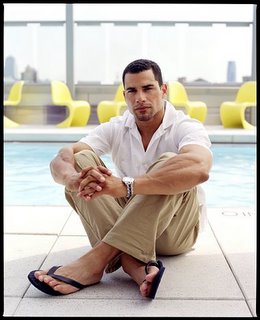 Reggie H. sent me and Ryan this photo today (it originally was posted on MostProper, a blog that features lots of "phyne sights" in Reggie's words), letting us know that Franky G. (pictured at left) will be in Saw 2, which I gather is the sequel to Saw. I had to write back to let Reggie and Ryan know how out of it I must be, since I'd never heard of the initial film, which according to IMdB (the online encyclopedia of film information), appeared in 2004. A horror movie directed by James Wan (¿quién es él?), starring Danny Glover, Cary Elwes, and quite a few actors I've never heard of, it concerns a serial killer whose calling card is a circular saw, or something like that. The general viewer rating for Saw is 7.5 stars out of 10, which ranks higher than Hitchcock's superb Suspicion or Cassavetes's standard-setting Gloria. Yeah, right.
Reggie H. sent me and Ryan this photo today (it originally was posted on MostProper, a blog that features lots of "phyne sights" in Reggie's words), letting us know that Franky G. (pictured at left) will be in Saw 2, which I gather is the sequel to Saw. I had to write back to let Reggie and Ryan know how out of it I must be, since I'd never heard of the initial film, which according to IMdB (the online encyclopedia of film information), appeared in 2004. A horror movie directed by James Wan (¿quién es él?), starring Danny Glover, Cary Elwes, and quite a few actors I've never heard of, it concerns a serial killer whose calling card is a circular saw, or something like that. The general viewer rating for Saw is 7.5 stars out of 10, which ranks higher than Hitchcock's superb Suspicion or Cassavetes's standard-setting Gloria. Yeah, right.But anyways, who cares about Saw or Saw II, really? At my age I'm able to recognize quite clearly there's enough horror going on in the world around me that I don't wish for or need cinematic treatments of it anymore--the important issue is the man above. I know I'm not alone in thinking that the New York native Puerto Rican-American Franky G (for Gonzalez) is one of the more beautiful men in film and TV, am I? And the man is the same age as me, 40 years old! Sadly and unsurprisingly, Hollywood doesn't know what to do with this kind of (male) beauty, which has always fallen and continues to fall outside its "mainstream." In my alternative universe, Franky G, who does have some acting talent (though he's no Denzel Washington or Robert DeNiro, and that's OK!), would have regular roles, both in movies and on TV. And he'd have material suited to his talent and looks, not the sort of dreck that characterized Johnny Z, his late show on Fox, which brings me to another point.
As I stated in my second post on Noah's Arc, I intend to keep watching that show, despite how bad it is. Thinking of Johnny Z, I realized that in fact lack of quality is no bar to my watching a TV show, if it has other things going for it (humor, attractive stars, some catchy element). For much of my life I eagerly watched bad or retrograde TV (F Troop, My Three Sons, One Day at a Time, Good Times, Dallas, Eight Is Enough, Family, Fantasy Island, The Love Boat, Three Is Company, The Dukes of Hazzard, The Greatest American Hero, Cybill, Melrose Place, Beverly Hills 90210, Sister Sister, The Parkers, etc.) for a variety of reasons other than quality (which I think was and is one key element of, for example, Batman, The Adventures of Rocky and Bullwinkle, Schoolhouse Rock, Zoom, The Electric Company, Speed Racer, The Patty Duke Show, Get Smart, Monty Python, Maude, The Golden Girls, Frank's Place, The Cosby Show, Seinfeld, SCTV, The Kids in the Hall, Mr. Show Show, certain seasons of SNL, The Wire, The Sopranos, Six Feet Under, The Comeback, etc.).
As I age, though, I can't really take too much bad or retrograde TV anymore, especially shows that depict a world set anywhere but Iceland or Finland (or Wyoming, let's say) that's focused excessively on the very young and rich or economically privileged and devoid of any people of color. Just no. No. NO. My tolerance for minstrelsy also has shrunk to nil. I don't want to waste my time what's essentially a repurposed lost script for Amos n' Andy. Nevertheless, friend David M. and I caught the first episode of Franky G's Johnny Z and faithfully watched the really awful--dreadful, cringe-inducing, appallingly badly written--subsequent ones every week, until, mercifully, it was pulled. If you never saw the show, you missed little--except, of course, for Franky G.
He was the ONLY reason to watch it. The entire scenario--a Latino late-30s-something, with a kid and ex-wife, gets out of jail, is on parole in NYC, has to keep clean yet cannot help getting involved with criminals, etc.--started out with a mild stench. So much of it was utterly implausible: a British gangster in NYC...wait, let me repeat that. A British gangster--in New York City! Okay, there may be British gangsters in New York (New York has all kinds of people, and there certainly are quite a few in London, Manchester, Liverpool, Birmingham, etc.) but seriously, and at the risk of political incorrectness, while I appreciate the writers' attempts at being...inventive?...wouldn't a Black or Latino or Italian or Irish or Russian or Albanian or Greek or Chinese crime boss be more believable...well, you get my drift. We're talking about New York City. Any student in an introductory fiction class would find every mention of this character in a story based on the initial premise of Johnny Z surrounded by circles and question marks.
Then there was his sidekick, this endlessly babbling, unspeakably annoying, wannabe comic White nerdy guy who looked like a plucked chicken, and they shared a huge apartment...in New York City...I kept wondering, why on earth wasn't this waste of space and dialogue shed during the development phase? David and I both concurred, of course, that the network probably thought that the show wouldn't succeed without a central White character. So why not instead give us a real New York type, a White tough, say from Queens or Brooklyn or Staten Island, or if you need to ramp up the comedy, New Jersey, who, far more conceivably, might have met Johnny Z on the inside and then caught up with him when they both got out? Instead, the quasi-Jerry Lewis-esque buffoon the show selected didn't work at all. And then they added an Australian bail bondswoman, who just happened to be a busty blonde bruiser, which satisfied some other show runner's or writer's fantasies, and...well, the show was off the airwaves not long thereafter.
So there is no chance anymore to watch horrible TV just to see Franky G every week. I doubt I'll go see Saw 2, so I'll have to miss Franky G's newest star turn. Which is a shame, because I relish any opportunities to see Franky G. onscreen. And not only Franky G, but any number of other actors that whose beauty lights up the screen, but whom Hollywood and the major networks in New York don't know what to do with. (Mekhi Phifer has kept his job on ER and there's the two guys, Eva Longoria's husband and Alfre Woodard's son on Desperate Housewives, a show I don't watch, but that's about it now that Taye Diggs, Keith Hamilton Cobb, Matthew St. Patrick, etc. are no longer on regularly airing shows.) But then things may change, as they already have in my lifetime, though slowly, slowly.... So cable TV stations, just so you know, Franky G could still be a contender....
Friday, October 28, 2005
Emanuel Xavier Attacked
 Just the other day I received several emails (includinng one from my NYPLC brother Blackkat) concerning author, actor and activist Emanuel Xavier; each sent around word that he'd been brutally attacked by a group of young men near his home in Brooklyn. On his blog Blabbeando, activist Andrés Duque gives a fuller account of the attack:
Just the other day I received several emails (includinng one from my NYPLC brother Blackkat) concerning author, actor and activist Emanuel Xavier; each sent around word that he'd been brutally attacked by a group of young men near his home in Brooklyn. On his blog Blabbeando, activist Andrés Duque gives a fuller account of the attack:On the evening of Tuesday, October 25th, spoken word artist, openly queer activist and actor, Emanuel Xavier, was brutally beaten at random by a street gang in the Bushwick area of Brooklyn. On his way to visit his mother, currently struggling with cancer, the poet was surrounded by fifteen to twenty young Latino men and punched several times in the face. The crime has not been labeled a biased attack and - though one of his poems is set to appear in King’s Court, the Almighty Latin Kings Nation newsletter - no gang affiliation has been established and is unlikely. Though he declined hospitalization, initial statements described him as badly bruised with possible hearing damage to his right ear.Andrés applauds Emanuel's courage at speaking out about this attack, as do I, and notes what an important figure in the literary and arts community he is. I concur. In addition to his seminal collection of poems Pier Queen, he also has authored Christlike and Americano, and edited a collection of spoken word poetry called Bullets & Butterflies. Emanuel has appeared on Def Comedy Jam, and in the movie The Ski Trip.
I should add that I first came across Emanuel when he worked at the now vanished A Different Light gay bookstore, which had moved only a few years before to 19th St. just off 7th Avenue. (A Different Light closed in March 2001.) That was in the mid-1990s, which now seems like a truly distant era. We didn't really make each others' acquaintance then, but we'd exchange hellos, and so when I came across Pier Queen several years later, in Creative Visions, the gay bookstore (is it still open?) that replaced A Different Light on Hudson Street, I was delighted to learn that he was a writer and to read his work. I have gotten to see him read and perform once, and it was worth the wait. I wish him a full recovery, and hope that the NYPD can apprehend all of the people involved in the vicious assault on him.
Update: Andrés has updated information on Emanuel Xavier, his recuperation and some rumors that have arisen about the attack on his Blabbeando site.
Thursday, October 27, 2005
Horn Tooting
What made it even more special was that two of the other winners, Thomas Sayers Ellis and Tracy K. Smith, both amazing poets, were members with me years ago in a Black writers group based in Cambridge (and later Boston) called the Dark Room Collective. Thomas actually co-founded the Dark Room with poets Sharan Strange and Janice Lowe (whom I hadn't seen for years but then ran into several times this past summer at my New York gym, 24/7.) Additionally, among my other links to Tracy is that her first book of poems, The Body's Question, won the 2003 Cave Canem Poetry Prize; my collection was one of two finalists for the prize (I spent 3 summers in CC's workshops, becoming a graduate fellow in 2001).
Here are some photos of the event, taken by C. and I:

Carolyn, I, Tracy, Thomas

I, Carolyn, and Jennifer
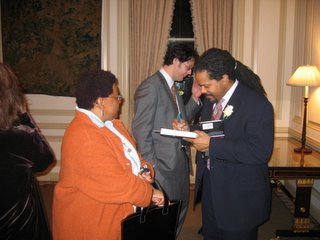
Patricia and I (fellow winner Ilya Kaminsky stands in the background)

C. after the ceremony (Hi paddi!)
Wednesday, October 26, 2005
Chi Sox Win Series, Trump Stros 4-0 + Noah's Redux
 How's that for a headline? Not so great, I know, but the Chicago White Sox did finally win their first World Series championship in 88 years, defeating the Houston Astros tonight 1-0, and winning in a four-game sweep. Veteran outfielder Jermaine Dye, who drove in the lone run tonight, was named World Series Most Valuable Player, though that honor could have gone to relief pitcher Bobby Jenks, who preserved Sox leads last night and tonight, or shortstop Juan Uribe, who had made several errors in previous games but rang the Astros' final two death knells with a superb foul catch in the stands and brilliant fielding and a throw that led to the final Houston out.
How's that for a headline? Not so great, I know, but the Chicago White Sox did finally win their first World Series championship in 88 years, defeating the Houston Astros tonight 1-0, and winning in a four-game sweep. Veteran outfielder Jermaine Dye, who drove in the lone run tonight, was named World Series Most Valuable Player, though that honor could have gone to relief pitcher Bobby Jenks, who preserved Sox leads last night and tonight, or shortstop Juan Uribe, who had made several errors in previous games but rang the Astros' final two death knells with a superb foul catch in the stands and brilliant fielding and a throw that led to the final Houston out.General Manager Ken Williams, one of the few (the only?) Black GMs in the major leagues, and Manager Ozzie Guillén, a former star infielder, Venezuelan native, and one of the few Latino managers, also deserve tremendous praise. In fact sportswriters openly doubted and questioned the often outspoken (sometimes to the point of offensiveness) Guillén throughout the season, especially when Chicago experienced a late-summer swoon, before righting itself and winning its division.
This year marks one of the rare periods in Major League Baseball history, especially in the post-Jackie Robinson era, when the Series has had two consecutive years of four-game sweeps; the last time was in 1998-1999, when the powerhouse New York Yankees accomplished it, but they'd done it several other times, and have also won more than 20 Series crowns. Last year's winner was the long suffering Red Sox (originally Stockings), this year the White--and Chicagoland fans all across the vast swathe of the city and suburbs south of Madison Street (and some outside that demarcated territory) get to cheer what for years looked like an impossibility. Now it doesn't look like an impossibility even for the hapless Cubs! Congratulations, White Sox!
***
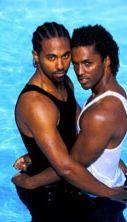 I finally caught the first episode of Noah's Arc, director and writer Patrik-Ian Polk's series on Logo, which C. had taped for me, as well as the second episode, which aired tonight, and I'm going to let C.'s previous, hilarious review stand. No quibbles here.
I finally caught the first episode of Noah's Arc, director and writer Patrik-Ian Polk's series on Logo, which C. had taped for me, as well as the second episode, which aired tonight, and I'm going to let C.'s previous, hilarious review stand. No quibbles here.I do want to add that while there is so much to criticize with this show--the acting, the writing, the implausibilities, the characterizations (Chance?), the materialism, the constant reversion to clichés (I have never ever witnessed any Black people, let alone anyone else, eating out of Chinese takeout food boxes as they depicted here and as films and TV shows always depict--try plates!), the binaristic view of sexuality in terms of Wade, the 1980s feel, etc.--I actually enjoy it. I even felt moments of...well, if not exact recognition, something close to it.
Not one of the primary characters strikes me as especially likeable or, outside of Alex, Wade, and the two peripheral characters Eddie and Tre, resembles any Black gay person I know. In addition, I found Halle Minnelli's (Ricky's) lack of a living space outside his store/bathhouse bizarre (and his hairdo annoying), wondered whether Chance (like Noah) was independently wealthy or one of the most brilliant economists under the sun to afford his lifestyle (so perhaps just make him a business or med school prof and then, like Oz, dare anyone to recognize or even challenge the background change), and tried to figure out if Noah's character had originally been written as a woman (on the model of Sex and the City's Carrie Bradshaw, or any of the characters on Girlfriends), since it sometimes felt as if we were being read to read him, at least in a semiotic sense, in this manner. (Gender theorists, you betta work with this one.) In fact, in episode 1, the phrase that kept coming to mind in terms of Noah was "too many things...."
But still, I actually want to see it again. I do.
C. thought the second episode was better than the first, and I agree, though Chance's SUV-"shop-wrecking" (or "moving furniture," as C. told me was the more current term) was...totally implausible, probably would have meant he'd be out of a job (note to writers: most universities, including UCLA/USC/etc., will fire a tenured professor for felonious behavior, which driving a car into someone's living room/day room/den, etc., probably would qualify as, given the decided intent), and in any case, his character is so rebarbative (what's up with that voice, that delivery, the utter inability to show even the slightest emotion beyond a slightly upcurled upper lip?) that I really find it hard to believe the other three characters would want to spend more than a few minutes around him. I mean, can we really blame his boyfriend, Eddie, who appears to be far more interesting and nuanced, for looking for some on the side--or at least wanting to get the hell out of that house?
I did like that the episode played with some expectations, though, including bringing in the transgender (or gender-disrupting) designer, and having the new employee mack hir (I think that's the right pronoun, isn't it?), that it pressed the issue of safe sex, and that it evoked cybersex as sex, broached the issue of alternative sex play, and, at the risk of sounding crass, it's great to see lots of men running around in no clothes or cute clothes (or BDSM outfits!) and sexing things up. So it wasn't all bad. But....
And yet, I intend to keep watching it. Perhaps it is, as someone (Rod?) sagely said, like watching a car-wreck, which sounds rather morbid when Noah's Arc really doesn't have an edge: it's silly, at times to the point of absurdity, often unbelievable or like a fantasy gone awry, but also at times sexy and funny while intending to be so. Still the wreck simile, which I guess Chance's moment of payback literally (and ironically?) embodied, does seem to apply. And I'll keep staring/watching.
Tuesday, October 25, 2005
2000 Dead
 2,000 US soldiers killed in Iraq between March 13, 2003-October 25, 2005
2,000 US soldiers killed in Iraq between March 13, 2003-October 25, 2005(1,863 killed between 1957-1965 in Vietnam)
Who are the fallen soldiers?
198 Other US coalition soldiers killed
15,000+ US soldiers wounded in Iraq
26,000-30,000 Iraqi civilians killed in Iraq
100 journalists killed in Iraq
No WMDs found
No links between Saddam & Osama bin Laden (still free)
No greetings with flowers and flags
Plamegate/Treasongate
More global terrorism each year since the 2003 invasion of Iraq
More sophisticated attacks against US and coalition troops each year
A divided Iraqi state with a strong, Islamicist Shiite government linked to Iran
$203,463,100+ in US funds spent so far on Iraq....
CAUSA BELLI by Andrew Motion
They read good books, and quote, but never learn
a language other than the scream of rocket-burn.
Our straighter talk is drowned but ironclad:
elections, money, empire, oil and Dad.
Copyright © 2003, Andrew Motion, on PoetryInternational.com
--
Andrew Motion is the Poet Laureate of the UK
Monday, October 24, 2005
RIP: Rosa Parks
(b. 1913, Tuscaloosa, Alabama - d. 2005, Detroit, Michigan)


Sunday, October 23, 2005
World Series: White Sox vs. Astros
 Okay, the World Series is already underway, so why am I just now posting? In fact, the Chicago White Sox (including SS Juan Uribe, at left, courtesy of Chicago Comcastsportsnet) are now up 2-0 over the Houston Astros, having won the opening game behind José Contreras 5-3, and tonight's game in the final inning in dramatic fashion 7-6. Now both teams head down south to play under less trying weather conditions (it was chilly last night, and cold and rainy tonight in Chicago) in the Astros' stadium. I guess it took me a few days of recovery after the Cardinals' NLCS loss to Houston to focus on the this matchup, which appeared initially to be akin to the 1966 or 1968 World Series, that is, all about starting pitching, but which has turned out to be a test of whose bullpen won't collapse.
Okay, the World Series is already underway, so why am I just now posting? In fact, the Chicago White Sox (including SS Juan Uribe, at left, courtesy of Chicago Comcastsportsnet) are now up 2-0 over the Houston Astros, having won the opening game behind José Contreras 5-3, and tonight's game in the final inning in dramatic fashion 7-6. Now both teams head down south to play under less trying weather conditions (it was chilly last night, and cold and rainy tonight in Chicago) in the Astros' stadium. I guess it took me a few days of recovery after the Cardinals' NLCS loss to Houston to focus on the this matchup, which appeared initially to be akin to the 1966 or 1968 World Series, that is, all about starting pitching, but which has turned out to be a test of whose bullpen won't collapse.The White Sox vaunted starters so far have been average. In game 1 Contreras gave up three runs, hardly dazzling. In game 2, Mark Buehrle, a native St. Louisan, surrendered 4 runs in 7 innings. So how did they win both games? In both games, the Astros relief corps, one of the best in the major leagues, has been sketchy at best, turning Roger Clemens' hamstrung 2-inning performance 1 into a loss, and in this game, blowing what was a superb start by Astro Andy Pettitte, who only gave up 2 runs in 6 innings. Chicago has been able to get singles and home runs when needed, including tonight, when outfielder Scott Posednik, who hadn't hit even a single home run during the regular season (a shocking statistic for an outfielder), smacked one off Houston reliever and iceman Craig Lidge in the bottom of the 9th. I could hear the ecstatic cheers all the way up here on the far North Side.
As for the Astros, I understand that they've never won a World Series, though several of their individual players (Clemens, Pettitte) have. Most, however, have played for years without ever getting this far. (An observation: Houston appears to have the fewest people of color of any team in Major League baseball. Only one starter, cute top rookie Willy Taveras (below right, courtesy of Yucatan.com.mx) is not White, and there appear to be almost no non-White people on their bench, which is a little odd in 2005. There is, moreover, not a Black American anywhere to be found on their roster, which is not that strange, since 4-5 teams this year didn't have a Black American starter or hardly any Black American players.)
I don't think Houston, a very good team, is going to defeat Chicago this year and I hope they won't; but if the former First Couple, Poppy and Barf, decide to start mugging at and smooching on camera, I'll be very actively rooting against them. If Prince of Incompetence W himself shows up....well, let's just say a 4-game Chitown sweep wouldn't be consolation enough. Something tells me, though, that with Fitzmas/Fitzukkah imminent and the pending indictments set to be decided on Tuesday (and perhaps issued soon thereafter), our Feckless Leader won't be leaving Washington anytime soon, not even for yet another Gulf Coast photo op, though his brother and fixer Jeb beckons him down to Florida for some the Hurricane Wilma walkarounds to try to raise W's Faux News/Gallup poll numbers off the ocean floor.
During the regular season I more than once harbored (and occasionally expressed) a private hope that the White Sox would at least make the playoffs, in part because I wanted them to knock the self-mythologizing Red Sox off their bandbox, and because I would have loved to see them play the Cardinals in the World Series. They did satisfy the former desire, but the latter was out of their hands. As for their not winning a World Series since 1917, their infamous "Black Sox" scandal, and their not even being in the Series since 1959, I could care less. My fandom doesn't run that deep, among American League teams I support the Yankees first and foremost, and the Angelheimers were a lot easier on the eyes.

But I have derived additional satisfaction from the fact that among Chicago's baseball teams, it was the White Sox, and not the even more outrageous self-mythologizing Chicago Cubs (of Wrigley Field, that quaint museum and beerhall on Clark and Addison), who now have a chance to break a long streak of bad luck, missed changes, a curse, the gods know what. The Cubs, in addition to being the Cardinals' chief rivals, usually have Chicagoland (not just the Hog Butcher of the world, mind you, but the teeming Midwestern nerve center of more than 9 million people!), knotted around their finger. For the last few weeks, and perhaps a while longer, the White Sox will keep that knot untied, and perhaps begin to lace up some love of their own.
So the Chicago White Sox in 5 (or 4 if those two show their faces too much)!
Saturday, October 22, 2005
Quote: Octavia Butler
with wisdom and forethought.
To be led by a coward
is to be controlled
by all that the coward fears.
To be led by a fool
is to be led
by the opportunists
who control the fool.
To be led by a thief
is to offer up
your most precious treasures
to be stolen.
To be led by a liar
is to ask
to be told lies.
To be led by a tyrant
is to sell yourself
and those you love
into slavery.
--Octavia Butler, an excerpt "From EARTHSEED: THE BOOKS OF THE LIVING," in The Parable of the Talents (New York: Seven Stories Press, 1998), p. 167.
Friday, October 21, 2005
Slavoj Zizek on "The Subject," Racism, and Hurricane Katrina
 Who says critical theorists, even famously abstruse ones like the Slovenian post-Lacanian critic and professor, Slavoj Zizek, don't or can't make valuable contributions to the (American) public discourse? Here's one: in "The Subject Supposed to Loot and Rape," in In These Times, he reads the "racism" in the hyperbolic claims of violence and looting that were made as the Hurricane Katrina tragedy unfolded. Though subsequent studies of the supposed orgies of bloodthirstiness (including child rapes and cannibalism!) have been debunked, Zizek is more interested in the psychological mindset that constructs the "subject who is supposed to..." and this case, "the [Black] subject who is supposed to [commit violent acts when unloosed, by events like Hurricane Katrina, from the constraints of civilization]...." You know, those _______ gangbangers who were firing at helicopters, conducting street-by-street serial rapes, etc.
Who says critical theorists, even famously abstruse ones like the Slovenian post-Lacanian critic and professor, Slavoj Zizek, don't or can't make valuable contributions to the (American) public discourse? Here's one: in "The Subject Supposed to Loot and Rape," in In These Times, he reads the "racism" in the hyperbolic claims of violence and looting that were made as the Hurricane Katrina tragedy unfolded. Though subsequent studies of the supposed orgies of bloodthirstiness (including child rapes and cannibalism!) have been debunked, Zizek is more interested in the psychological mindset that constructs the "subject who is supposed to..." and this case, "the [Black] subject who is supposed to [commit violent acts when unloosed, by events like Hurricane Katrina, from the constraints of civilization]...." You know, those _______ gangbangers who were firing at helicopters, conducting street-by-street serial rapes, etc.(Hundreds of thousands of people were displaced, and thousands starved and thirsted, suffered from lack of medicine and adequate medical treatment, lost everything and were subjected to a horrifically cruel oversight by the federal government which, astonishingly (or not) is still paying "Brownie-you're-doin'-a-heckuva-job!" even though he was more concerned with getting his eat on than dealing with the dire conditions in the Superdome and elsewhere....)
Zizek goes on to link this to a larger discussion of globalization and the fall of walls meant to keep people in (as in the Berlin Wall), which led Francis Fukuyama, recently a critic of neoconservatism and the W debacles, to declare, pompously, "the end of history." Ah, such vision, such genius. Only, as Zizek points out, what has followed is the rise of new walls, such as the one in Ceuta, to keep the ______ Others out of the wealthy, liberal states (Spain, France, Italy, etc.) of the West, as well as the continuing existence of internal, often "invisible" socioeconomic walls and barriers which separate the impoverished, mostly Black (but also poor Whites, Asians, Latinos, and others) from the middle and upper-classes and industrial base in New Orleans, which in any case depend upon low-cost labor for capitalism to flourish. (And so far, no one wants those poor folks, especially all those poor Black folks, to come back anytime soon.) He even includes that monstrous hypocrite Bill Bennett in his reading (who says foreigners aren't paying attention to our barbarism?). Says Zizek:
This brings us back to rumours and “reports” about “subjects supposed to loot and rape:” New Orleans is one of those cities within the United States most heavily marked by the internal wall that separates the affluent from ghettoized blacks. And it is about those on the other side of the wall that we fantasize: More and more, they live in another world, in a blank zone that offers itself as a screen for the projection of our fears, anxieties and secret desires. The “subject supposed to loot and rape” is on the other side of the Wall—this is the subject about whom Bennett can afford to make his slips of the tongue and confess in a censored mode his murderous dreams. More than anything else, the rumors and fake reports from the aftermath of Katrina bear witness to the deep class division of American society.
It's also worth reading the comment section, where several posters go at each other and misread Zizek, which is hardly surprising. (The denial of racism, unsurprisingly, factors in here.) That Sublime Object of Ideology requires at least two or three readings, almost Straussian in focus, to be understood fully.
Thursday, October 20, 2005
Three Reviews
 Though I'd badly wanted to see Patrik-Ian Polk's Noah's Arc, the first Black gay (male) series on TV, which premiered last night on Logo, the new gay channel, my local cable company does not yet have the station (in this most cosmpolitan city that is the heart of the Heartland). But my partner C. did catch it. He left me a phone message after catching only a few minutes, and then sent me this e-mail review, which made me laugh out loud before I headed off this morning to my introductory fiction class (in which we read a Richard Bausch story that also contained lines that were outrageously funny--an achievement I am always willing to praise). Rereading the review this evening made me laugh again.
Though I'd badly wanted to see Patrik-Ian Polk's Noah's Arc, the first Black gay (male) series on TV, which premiered last night on Logo, the new gay channel, my local cable company does not yet have the station (in this most cosmpolitan city that is the heart of the Heartland). But my partner C. did catch it. He left me a phone message after catching only a few minutes, and then sent me this e-mail review, which made me laugh out loud before I headed off this morning to my introductory fiction class (in which we read a Richard Bausch story that also contained lines that were outrageously funny--an achievement I am always willing to praise). Rereading the review this evening made me laugh again.NOAH'S DRECK
Opening Scene; 4 dizzy queens clumsily rollerblading on some boardwalk in Cali. Doris Day, I mean, Noah, breathlessly, lips pursed, clutching his chest runs into a "friend" who the other gurlz don't know and spends the next 2 minutes breathlessly, lips pursed, clutching his chest introduces said queens to said friend all of whom stumble over themselves like cats in heat to make an impression on him, he being Wade.
Turns out man is straight but heavily mackin' Doris, I mean Noah. Entire episode revolves around should he or shouldn't he, can he or can't he sleep with Wade and... his girlfriend, which is the only way Wade will slip it to him.
Other themes in this episode; Slut friend sleeps with male employees, Dame Edna friend discovers partner of 7 years has online sex life, Rudolph Byrd friend moves in with lover after only 6 months of dating. And so it goes. Empty stereotypical characters, HORRIBLE acting from everyone but especially Doris Day, I mean Noah, who can only communicate breathlessly, lips pursed and, clutching his chest and sighing while running around in some of the most frightening early 80's madonna outfits I have ever seen. The entire episode, though contemporary, seems somehow stuck in 1983. The only characters who seemed interesting were Dame Edna's partner, Wade, and the thugged out brother the slut plays around with in the store.
They reeeeeeeally need to re-tool this.. i think that's the lingo...
Did anyone else catch the premiere? What do you think? C. also pointed me to this Post-Gazette review, "Noah's Arc is racy fun but shallow," which took a similar stance. (One question: why is the character on the far right featuring a Liza Minnelli do and wearing what looks like lipgloss? Do Black gay men in Los Angeles run around looking like this? They certainly don't in New York, Chicago, Washington, Boston, Atlanta...or is it an LA thing?) The outtakes on the Noah's Arc website give a little bit of its flavor and lots of shots of sexy men, but little of the what the series' narrative arcs might look like, the fullness of the characterizations, the overall quality of the writing.... A friend of mine, whom I'll call J., was in communication with Polk at one point, and J. has written spec scripts and is a great writer, so maybe he can take up C.'s challenge and help with the re-tooling. I want this series not only to be as good as the standard HBO has been setting, but to succeed and perhaps last a few years. If it's as shallow as it sounds, it might not last that long, especially once the novelty wears off.
***
Other reviews: In today's Salon, Andrew O'Hehir harshly reviews Steve Martin's new film, Shopgirl, which he adapted from his best-selling novella of the same name. (Once while in a Waldenbooks in New York, I picked this book up, read a page, and then experienced a moment of despair that this trite crap would sell unaccountably more copies than 10 other, better written books ringing on the bookshelves.) O'Hehir really, really dislikes it. But what he especially dislikes is Martin's performance. He calls it a bad film. A very bad film. He even devises an analogue for Martin's character/performance, and it ain't pretty:
I'm not quite sure what has happened to Steve Martin; I was never his biggest fan, but some of his early movies are silly and fun and some of his mid-period ones, like "Roxanne" and "L.A. Story," are enjoyably sweet. If I were his therapist, I would no doubt applaud his desire to reinvent himself as an author of worldly-wise fiction. I haven't read "Shopgirl" and am hopeful that it's better on the page than on-screen (although Martin's snippets of voice-over narration are not encouraging: "...he had hurt them both, and he cannot justify his actions except that, well, it was life"). But his character in the film, resembling more a Madame Tussaud waxwork of Steve Martin than the real thing, crystallizes all the discomfort below the surface of "Shopgirl" and turns a dreary movie into an awful one.Ray is supposed to be the suave older guy with money and taste who sweeps Mirabelle from behind the glove counter at Saks (if indeed the Saks store in L.A. even sells gloves) and makes her feel appreciated, in body and spirit, for the first time. First of all, this is a trite and slightly unpleasant theme that cries out for original handling and doesn't get it here. Martin's performance is one of implacable, rubberized unhappiness; you get the feeling he saw Bill Murray in "Lost in Translation" and thought, "I can do that."
He can't, though. Is Ray a damaged divorcé who falls in love with Mirabelle, after his own fashion, but can't express his feelings? I guess that's the idea, but you can't really tell. He could also be planning to add her to his collection of chopped-up girlfriends beneath the pool. He could be a narcoleptic. He could be the reanimated corpse of Richard Nixon, nervously sweating embalming fluid. He could be shot so full of Botox it's a wonder he can speak at all.
Yikes! "The reanimated corpse of Richard Nixon!" Oh well. Jason Schwartzman, a really annoying, unattractive actor is in this film. He's not Jon Cryer, but he comes close. I know he's well-connected, but he's really not very photogenic nor is he particularly talented (he was good in Rushmore, and that's about it). So please, Hollywood, let's use him sparingly in films. Very, very sparingly. Also, O'Hehir points out that this is yet another "aging celebrity's unpleasant" personal fantasy that's been made into a major Hollywood film, and for this, I thank him. In fact, one of the reasons I loathe most Hollywood films is because far too many of them are drawn from a very narrow racial, class and gender perspective, or from an equally narrow bank of fantasies--which is to say, most of the original screenplays for major Hollywood films that get churned out strike me as the products of a small set of people who appear to have little knowledge of the vast majority of people out in the country, of regions outside a few enclaves on either coast, of anything beyond their immediate ken. And the older, male, hetero fantasies, from screenwriters, celebrities, directors, and producers, and those that fit all four categories, are also grating. Please, no more such films. We know you lust after nubile, adolescent and post-adolescent, preferably blonde females (or in Spike Lee's case, lesbians of color). It's neither fresh nor interesting any more, if it ever was. It hasn't been for years. So please spare us. Seriously.
***

Yesterday the award-winning poet and University of California, Irvine professor Michael Ryan came and read at the university. I was only mildly familiar with his work, and totally unaware that he too was a native of St. Louis (till the age of about 7). After a sparkling introduction by my colleague Robyn Schiff, he read for only about 35 minutes or so, beginning with a light and humorous poem, "Airplane Food," that actually made the phrase "baby bundt cake" work, and then turned towards some of his darker materials, which included a poem addressing a murdered young woman ("A Dead Girl"), an injured sister ("Ashpits, St. Louis, 1951"), a voyeur watching a "Brazilian-thong clad courier" ("Open Window, Truck Noise, 3 AM"), a character known as "Dickhead" ("Dickhead"); larger themes included sexual desire, suffering, disappointment, death. A number of the poems, which dealt with everyday lives and pedestrian subjects (on the surface at least), were in 16-line quatrain form, and all featured not only vivid and memorable lines
"Last night I got shot in the head...." ("Flimsy")
"Cruelty turns to astonishment." (ending of "Dickhead")
"Maybe you're a verb / or some lost part of speech" ("God")
"As Chekhov put it, compassion down to your fingertips" ("Reminder")
"Their light — their light — / pulls so surely. Let it." ("Reminder")
but a sure grasp of narrative drama, portraiture and concision. I vowed after Ryan was finished to pick up his New and Selected Poems, and when I see a bit more of a clearing to read new work, I plan to do so. (I also will post my little drawing of him here soon.)
Wednesday, October 19, 2005
MLCS Over, Chisox to Face Stros in Series
As I learned when the literary festivities ended, the Houston Astros defeated my favorite team, St. Louis Cardinals 5-1, behind the excellent pitching of Astro Roy Oswalt, and timely hits, to take the National League pennant. The Astros, who finished with a 4-2 record against the Cardinals, now go to the world series for the first time in their 44-year-history. Though the Redbirds had defeated Houston in their season series, they failed at what had been their chief strengths from April to September: starting pitching, clean fielding and steady hitting. Their starters led the team to the lowest ERA in the league (even better than Houston's pitchers), but this year the team only won the games started by Chris Carpenter. Tonight, Jim Edmonds misplayed a ball in the field, and in several of the games the Cardinals flubbed plays, allowing the Astros chances they could not afford. Outside of Albert Pujols's monster bat, and his dramatic, game-winning home run two nights ago, in Houston, the Cardinals couldn't hit their way out a wet-paper bag, which sadly and disturbingly mirrored their performance last postseason. Meanwhile, Houston got superb pitching from the starters, middle-relievers and closers, made almost no errors, and despite being blanked repeatedly during the regular season, ate the Cardinals' pitching up. Tonight's starter Mark Mulder threw a ball behind Craig Biggio, leading to one run, then served up a home run to Jason Lane, leading to two more. Cardinals reliever Jason Marquis, a starter all season, served up another run, and reliever Julián Tavares did his part, giving Houston its 5th tally. More bad officiating, which has plagued the divisional and championship series, did not help; the Cardinals had mustered a rally, but Yadier Molina was called out at second, ending what was the Redbirds' best scoring opportunity. Now, the Astros regroup and head to the Windy City to face the Chicago White Sox.
The Chicago White Sox haven't won a World Series since 1917, and haven't been in one since 1959. They got this far this year mainly on the dazzling arms of their starters. José Contreras, Mark Buehrle, Jon Garland, and Freddy García pitched four straight complete games to take the American League Champion Series pennant from the Los Angeles Angels of Anaheim, and they are as good as matchup as exists to challenge the Astros' Andy Pettitte, Roger Clemens, and Oswalt. Contreras has been the best pitcher in the AL over the last two months, and he demonstrated his control in his winning start against the Angels. Buehrle and Garland were the workhorses of the 2005 season, and neither has shown any ill effects in the playoffs. García faltered a bit, but won his start and appears to be ready to help bring Chicago its first World Series championship since the era of World War II. The Chicago batters, however, will have to keep hitting, and manager Ozzie Guillén, whose emotions guide his compass, will have to rein them in and use some strategy if his hitters aren't knocking in runs.
I think Chicago has the better team, so I give it to them, in 6. I'm rooting for them this go round. Go White Sox!
Tuesday, October 18, 2005
Today + IIT's Koolhaas Gem
***
Back to Mies (not Miers) and IIT: one of the most interesting buildings on IIT's campus was OMA principal, Harvard GSD professor and Pritzker Prize-winner Rem Koolhaas's McCormick Tribune Campus Center, which is the new student center. Because of the campus layout, Koolhaas had to site the building partially beneath Chicago's Green Line El tracks, so he devised an ingenious solution, which was to wrap the tracks in a huge sound-dampening tube, and then curve the roof of the center under the tube, while grading the space beneath the roof so that once inside the building, the dip in the roof isn't as noticeable. I was curious to see this, so I went into the building, walked around, snapped pictures, and I can say it is a marvel. The only other Koolhaas building or space I've ever been in is the Prada Store in New York's Soho, which was a revelation when I first visited it, with its marvelously sloping floor, step-benches, liquid screens, and so on. I have not seen the new library in Seattle, but hope to one of these days. This building uses color, unanticipated angles and spaces, shifting sightlines, dispersed spaces for congregation, and a rich mixtures of colored glass, buffed metals and concretes, and advanced plastics, to create a space that feels both profoundly futuristic and virtual--it's almost like the embodiment and performance of Deleuze and Guattari's concept of "smooth space," but not merely as concept, but at experienced, situated, temporally grounded space.
Here are some photos of this center, which I think is one of the most interesting college or university buildings I've been in (some of my favorites were at MIT, though that was before they had begun their new wave of buildings that includes the Gehry, Holl and other masterpieces).

The tube(s), and the slanted (side) façade and entryway of the McCormick Tribune Campus Center
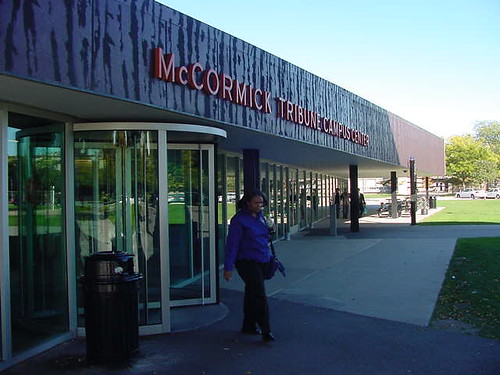
The side entryway up close. The tube hovers behind me. The slanting roof is hardly perceptible from this vantage.

The game room area, with the shimmering floor, the defamiliarizing angles, and the flowing contrasts of light and color.

There's a juice bar/café, with an aquamarine color motif, as well as the recurrent human symbols that appear all over the building, including on the glass walls facing State Street, where from a distance they form coherent images

The pumpkin-colored computer bank (which only featured PCs). The photo hardly captures the dramatic lines and color of this space.

The radio station, and the space behind the State Street façade, with its orange-tinted windows. The orange light was almost spellbinding, but this photo hardly does it justice.

The multicolored, multifloored cafeteria. Again, the photo hardly does it justice, since there are multiple spaces that constitute it, and depending upon where you are, you might be looking out onto or down or up into another area altogether.

A view of the State Street façade, with its orange-tinted windows. The slanted roof again has become invisible, though the Tube hovers in the background above the center of the building.
I'll end here. Koolhaas is about 60 or so, and has a number of projects underway, but I sincerely hope he gains or wins commissions for other US buildings. This one is hardly as experimental and dramatic as either the Prada Store or the images I've seen of the Seattle Library, but it's still a gem.
Monday, October 17, 2005
Very Brief Post + Quote: Fran Ross
***
She was once inadvertently in the state of hwip-as when she was riding in her uncle's car. A man standing on a corner as the car passed had seen her and had made sucking noises to denote his approval of her apperance. Oreo did not consciously know she had heard these primitive sounds, but as she was getting out of the car, she was in such an advanced state of hwip-as that when she yanked at the ashtray, mistakenly thinking it was a door handle, she heedlessly created for her uncle the only three-door club coupe in America.
--Fran Ross, Oreo (Boston: Northeastern University Press, 1974), p. 55.
Sunday, October 16, 2005
Boykin Barred from Speaking at MMM + Miller/Plamegate
***
First, this weekend, the highly controversial Nation of Islam leader's Rev. Louis Farrakhan's Millions More March (MMM) was scheduled to take place in Washington, DC. (It did, and drew far fewer people than organizers expected.) The MMM aimed to commemorate and capitalize on the ten-year anniversary of the Million Man March by reigniting a grass-roots conversation on the problems faced by Black people, and especially Black men, in America. We have the highest levels and rates of incarceration, the highest rates of unemployment, and some of the highest rates of HIV seroconversion in this country; Black families also disproportionately suffer from poverty, Black children have disparate rates of educational attainment compared with Whites and others groups, and on and on. The aftermath of the Hurricane Katrina tragedy laid bare so much of this for not only America, but the entire world, to see.

One element of this conversation that had gotten some recognition was the possibility of a dialogue involving Black LGBT people; Black LGBTs were present at the march in 1995, but one of the things that some Black LGBT leaders and organizations, like the National Black Justice Coalition (NBJC), had hoped for was that a real Black LGBT leader and activist could address the attendees. So over the last years, representatives from Farrakhan's camp and the march organizers had been in dialogue with the NBJC. They also were in dialogue with another Black LGBT organization, the Black Men's Exchange (BMX), a bicoastal outfit that began in Oakland in the 1990s. BMX's leader, who has advanced the term "same-gender-loving" (sgl) as a cultural-specific term to counter what he views as the White-normative implications of "gay," "queer," and other frequently used terms (on this page and elsewhere), appeared to have cemented an agreement to speak at the MMM. (He did, and I'm going to see if I can link to any video on CSPAN's site.)
Rod 2.0 and others, however, reported that noted LGBT activist, author, lawyer, and former Clinton White House staffer Keith Boykin (pictured above, at left, with Donna Payne, Farrakhan, and NBJC's H. Alexander Robinnson), along with representatives of NBJC, had spoken personally with Farrakhan, and was also set to speak at MMM. Keith not only has written two authoritative books on the Black LGBT experience, the first an excellent overview with lots of personal history (One More River to Cross), and the most recent one addressing issues related to the "down-low" (DL) identity and performance (On the Down Low), but has served as a leader on Black LGBT issues for years. (I should add that C. and I have known Keith since his law school days.)
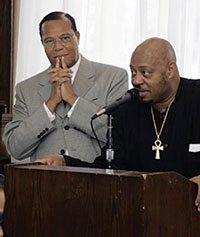
According to Pamindurham's diary today on the Website DailyKos, however, when Keith attempted to speak at the MMM yesterday, he was preventing from doing so by the homophobic Reverend Willie Wilson, who had previously made homophobic statements this summer (his particular fixation, like Senator Tom Coburn's (R-OK), appears to be lesbianism...), prevented Keith and the Human Right Campaign's Donna Payne, who'd accompanied him, from speaking. Pamindurham quotes several different sources, including MetroWeekly's Will O'Bryan, TerrenceDC's Million More March (Not) Missed, and Keith's own blog to fill out her account. According to Keith:
This is what happened today. After I arrived at the VIP tent shortly after 8 in the morning, my colleague Donna Payne spoke directly to Rev. Willie Wilson backstage, and he informed her that no one from the National Black Justice Coalition would be speaking today. Donna told Rev. Wilson that he was violating our agreement, and Wilson replied that the agreement was void because the Coalition had not responded by Friday. That was not true.
Rev. Wilson's excuse seemed a mere pretext to prevent us from speaking. Sadly, I am not surprised. He has been an obstacle to this process all along. Ever since his controversial July 3 sermon in which he blamed the rise of lesbianism for the problems in the black community, Rev. Wilson seems to have developed ill feelings toward the black gay community for responding to his attack. That was three months ago, and I had hoped to use my speech today to extend an olive branch to Rev. Wilson to move beyond our differences and heal our wounds, but his actions this morning made that impossible.
The powerful speech he was not allowed to deliver is here. The Washington Post reports today that Black LGBTs present then turned what was supposed to be a "unity rally" into a vocal protest and march at Keith's exclusion. More power to them! Meanwhile, did Farrakhan know from the beginning that this was a set-up? Was he acting in bad faith? As for the Talevangelist types people like Wilson, who call themselves "Christians," do they have any concept of what the Gospels say or of Christ's example of love and tolerance? And where are the masses of mainstream Christians who should be calling them out on their hatefulness and obsession with sexuality and homosexuality in particular? Why, in the midst of all that that Black people are facing, are people like Wilson so fixated on sexuality and homosexuality in particular? What are they afraid of or hiding from?
I also have to wonder, since Wilson and others allowed the BMX representative speak, what did he (since it's an all-male group) have to say, about the topics at hand, about sexuality, and about Keith's exclusion? Or did he collude, through silence and oversight, in our oppression and exclusion? I'm not wasting an iota of gray matter trying to figure out the answer to that question.
As for the Millions More March, I had not seriously considered attending, and am glad I didn't. I'm also glad to hear that "millions" didn't waste their time. (I do wonder if a good friend went, though.) While the focus on the issues facing Black Americans, Black men and women, Black families, is critical and crucial, and must translate into more than rhetoric or misguided reaction, Farrakhan, by affording Wilson so much power and allowing BMX to assert its very slanted viewpoints as any kind of statement about the experiences of Black LGBT or same-gender-loving people (BMX, what about Black lesbians, bis and transgender people?), proved that was the person to organize or foster the necessary discussions and conversations that have to occur, and underscored MMM wasn't the venue in which they'd take place.
***

By now, one would have to be hiding under a rock not to know at least the rudiments of the Treasongate-Plamegate-Traitorgate drama that is steaming towards a finale of sorts at the end of this month (or perhaps sooner), when Special Prosecutor Patrick Fitzgerald is expected to issue a series of indictments against individuals believed to have committed any number of crimes that arose from the outing in the summer of 2003 to journalists of and Robert Novak's publication of classified information in a newspaper column about Valerie Plame Wilson, a covert CIA operative whose husband, Ambassador Joseph Wilson, had emerged as a vocal critic of the W administration's propaganda efforts to build the case for the War in Iraq.
One key cog in the wheels of the outing has been New York Times reporter Judith Miller. As is also well known, she spent 85 days in a Washington jail for refusing to testify before an empaneled grand jury in Fitzgerald's probe. Although she presented her stance as a honorable example of journalistic integrity and honor, it has since emerged that in fact, Miller's role in this entire mess is much, much murkier. But then, for those who'd followed Miller's career and her close ties to neoconservatives and powerful Republicans, this isn't suprising. In the lead-up to the Iraq War, she wrote a series of articles touting exclusive, sourced information about Saddam Hussein's weapons of mass destruction capabilities and capacity; the articles and the information in them were later proved to be grossly wrong. In addition, she went to Iraq as an embedded reporter with the MET Alpha group after the fall of Hussein's rule to report on the discovery of those WMDs, which President W, Vice President Dick Cheney, Secretary of Defense Donald Rumsfeld, then National Security Advisor Condoleezza Rice, and Secretary of State Colin Powell had all claimed would be found. As critics of Miller--including yours truly--imagined, no proof--not just no conclusive proof, but no proof whatsoever--of an extensive WMD arsenal or of programs to weaponize the nonexistant nuclear materials, and biological and chemical agents that the W administration terrified the public into believing were in Iraq, was found, by any of the figures (David Kay, Charles Duelfer, etc.) charged with finding them. Those WMDs and the fact that they were readily weaponizable were, let us never forget, the W administration's chief and often-stated rationale and pretext for toppling Saddam Hussein and occupying Iraq. W pressed this point in his 2003 State of the Union address, and his officials reiterated it again and again in public appearances and speeches. Not to liberate the Iraqis from a tyrant with whom Reagan and HW had cooperated intimately for 8 years, not to spread democracy, not to protect Israel, not to remake the Middle East. It was to destroy the man who had all those WMDs AND avenge the 9/11 attacks, though, as the president himself subsequently admitted, there were no established ties between Saddam and Al Qaeda and its leader Osama bin Laden, the person behind the 9/11 suicide attacks.
After the truth of the nonexistant WMDs came to light, Times editor-in-chief Bill Keller had to issue a public mea culpa apologizing for the shoddy reporting and the paper's role in further the W administration's agenda. Five of the six faulty articles that Keller cited were written or co-written by Miller, who bizarrely claimed at the time claimed that events somehow vindicated her. Huh? Keller nevertheless took her off the WMDs beat shortly after taking over, but as he notes in the long, new quasi-mea culpa published in today's Times, the self-described "Miss Run Amok" (?) "drifted" back into "the national security realm." In fact, as recently as early this summer, before her stay in the hoosegow, she was again carrying water for the administration by pushing its slanted take on the United Nations' Oil-for-Food scandal. The scandal's chief investigator, former Federal Reserve chairman Paul Volcker, actually ended up implicating the US government's laissez-faire-to-negligent approach as a contribution the scandal, though Miller's articles said little about this. But back to Miller, how was she able to do what she felt like? Why wasn't there more--any?--control over this employee?
Meanwhile, the Fitzgerald probe has been cranking along since it got underway, after the strong push from CIA agents, in the fall of 2003. Slowly but surely, a number of Washington and New York journalists, including Miller, Time's Matthew Cooper, the Washington Post's Walter Pincus, and TV personalities Tim Russert, Chris Matthews and Andrea Mitchell, as well as high-level administration officials like W's political marioneteer and fixer Karl Rove and Vice President Cheney's chief of staff I. Lewis "Scooter" Libby, found themselves part of Fitzgerald's dragnet. Even the President, Vice President, and past and former Secretaries of State have testified; Condoleezza Rice admitted "cooperating" with Fitzgerald this morning. Although Libby, who was thought to be Miller's chief source, provided her with a waiver through his lawyer in 2004, Miller dramatically took a stand, after being ordered by a federal judge to testify in the case, that she would not reveal her supposedly "lone" source. (Libby later wrote a personal letter again giving her a waiver, but the drama queen refused to or pretended to believe it wasn't coerced.) The Times dramatically decided to back her, viewing and promoting her as a confidentiality champion, and consistently did so all through this past summer. Well, well, well, what a difference a year, some time in jail, a raveling story, and a competent lawyer named Patrick Fitzgerald make.

Miller is now out of jail and has testified twice before the grand jury. Supposedly she decided to sing like a canary (or should I say nightingale?) after Libby spoke with her via conference call and suggested she testify. This was after she realized that Fitzgerald might charge her with criminal contempt and that the grand jury could be extended, thus meaning she'd stay in jail for potentially 16 more months. Even the steady stream of important people (including major journalists, the problematic UN Ambassador John Bolton, and others) didn't lighten her time in the slammer very much; there is only so much bad food, thin mattresses, and monitored phone calls that most non-masochists can take. Not only has Miller sung (though she's ludicrously claimed she can't recall if Libby outed Plame to her), but she supposedly "found" a notebook from a June interview with Libby that she'd forgotten to pass onto the prosecutor; and, with her criminal attorney, Bob Bennett (brother of white supremacist-gambling-addict-hypocrite Bill Bennett), she may have cut a deal of some sort with Fitzgerald to keep her bony backside from returning behind bars.
Meanwhile, the august Gray Lady, the Newspaper of Record, the journalistic organ than ironically announces--despite its roles in the Whitewater fiasco, the relentless destruction of Al Gore that aided W in being able to stage his 2000 coup, the jayson Blair brouhaha, and the Iraq War buildup--that it publishes "all the news fit to print," had long remained silent about Miller, its disastrous coverage of the Plame outing, and the potentially criminal aspects of the affair. Other news organizations and innumerable blogs have repeatedly scooped the Times about its own reporter and the grand jury deliberations. So today, it served up a tepid bucket of spit (to modify Vice President John Nance Garner's phrase) by staff reporters, a long and hole-ridden story that posed more questions than it answered. A number of the statements in it simply did and do not make sense or square with each other, as if there were some major point that either the reporters or the Times itself was not telling us. (Which made me wonder--is or was Judith Miller a CIA or Pentagon or government agent herself?)
It also published a strange, evasive, self-serving, 3,500 account by Miller that should serve as grounds for her immediate dismissal, unless it was meant to be a joke or was the opening to her book proposal. One particularly troubling issue she raises in her piece was the fact that despite her self-proclaimed espousals of the sanctity of her role as a journalist and defender of the truth, she had a security clearance*, meaning that she was starting from the premise that she couldn't report on classified information she came across and was basically working as an operative. Say what? Did the Times know about and condone this, or did she hide it from them? And are other Times reporters operating under similar ethical and professionally dubious constraints? Can we trust them if they claim there aren't?
What both pieces underlined for me was that Times has displayed yet again that it cannot be taken seriously any more as a legitimate source of news regarding politics and national affairs (it still has interesting high arts, science, fashion, etc. coverage). Indeed, I was so personally disgusted that I wrote the following letter ending my brief experiment with TimesSelect. I sent it not only to their "cancel" e-mail address, but also to the Executive Editor, the Managing Editor, the Public Editor, and their Help Desk, just in case someone else there might see the piece. (I have already received an automatic response from the new public editor, Byron Calame.) I tried not to go overboard:
Dear New York Times:
I am writing to unsubscribe from TimesSelect.
While I have relied on the New York Times for many years as one of my main news sources and have long treasured your reporting, I am so dismayed and unnerved by the newspaper's long account surrounding the Judith Miller reporting scandals on WMDs and Iraq and the failure to address fully and truthfully her role in outing CIA operative Valerie Plame that I am going to have to unsubscribe from TimesSelect for now. Neither the long "mea culpa" nor Ms. Miller's self-serving sidebar answers a number of basic questions, including WHO WAS HER SOURCE and why can a Pulitzer Prize-winning journalist not recall who told her something so incredibly politically significant and valuable. Also, neither account explores why I. Lewis Libby would have been discussing Ambassador Joseph Wilson and his wife with her well in advance of his Op-Ed in the New York Times, who the mystery editor was who did not allow her to publish her story on the topic, what role UN Ambassador John Bolton may have played in this whole saga (since she had previously reported faulty information conveyed by him, like the illusory links between Iran and Cuba on WMDs, in the New York Times), and what her true connection was to the late Dr. David Kelly, who'd been exposed as the source on the "sexed up" intelligence in the Blair "white paper" that later turned about to be full of falsehoods.
Why has the New York Times not only given us the full account of what Ms. Miller was up to, but linked all these dots? I mean, this is one the great newspapers in the world, so I'm unclear about why it hasn't been able to make these connections.
But back to my first question, how is it that she cannot recall who told her the name "Valerie Flame" (or later "Victoria Wilson"), and why didn't the New York Times editors and writers press her on this?
When the New York Times's editor-in-chief, Bill Keller, and some more of your reporters completely clarify what really went on, when they explain why Ms. Miller is still employed at the newspaper after her series of dreadful, grossly wrong reports about WMDs, when they justify her defiance of her editor's decision to pull her off the WMD beat, when they explicate why she cannot say decisively who told her about "Valerie Flame," and so on, I will strongly consider signing up again.
For the time being, however, I cannot comprehend the damage that you have allowed to be done to your journalistic integrity. I can't comprehend it, but then I am not a journalist, just a very concerned citizen who wishes that a newspaper like the New York Times would live up to its potential and reputation, and serve as a beacon of the free press. Instead, it has repeatedly allowed Ms. Miller (like Elizabeth Bumiller, Frank Bruni, and so many others) to turn it into yet another propaganda weapon on behalf of the Bush administration. The effects of this on our politics, our public discourse, our standing in the world, and our country in general are incalculable.
 Many of the issues I raise in this unsubscription letter have been raised by others, but I really would love for the Times or Miller to answer the basic question of WHO told her the name "Valerie Flame" and later, I presume, "Victoria Wilson?" How could she not recall who did so, or is it more likely the case that she's lying to protect someone? If it wasn't Libby, then who was it? Why did she tell her editor that she hadn't been one of the people to whom this information was leaked? Why did she also try to have her lawyer get Fitzgerald to limit his questioning of her to the issue of Libby as her source if she says Libby didn't give her this name and someone else did? And why doesn't the Times piece ask these basic facts? I am not a journalist, as I note, nor a lawyer, and like all human beings, I transpose and mix up facts. (Hell, I can't even get names right anymore.) But isn't a journalist expected to remember who said what and when, and be able to use notes as a guide to backing up supposedly truthful statements? (Also, her odd recitation of what her "notes" confirm made me wonder, what does she recall? Because she surely didn't and couldn't let the notes speak for her to Fitzgerald and the grand jury.) Fiction writers, no. But people working in non-fictional genres, especially journalists, have this burden, don't they? Don't they?
Many of the issues I raise in this unsubscription letter have been raised by others, but I really would love for the Times or Miller to answer the basic question of WHO told her the name "Valerie Flame" and later, I presume, "Victoria Wilson?" How could she not recall who did so, or is it more likely the case that she's lying to protect someone? If it wasn't Libby, then who was it? Why did she tell her editor that she hadn't been one of the people to whom this information was leaked? Why did she also try to have her lawyer get Fitzgerald to limit his questioning of her to the issue of Libby as her source if she says Libby didn't give her this name and someone else did? And why doesn't the Times piece ask these basic facts? I am not a journalist, as I note, nor a lawyer, and like all human beings, I transpose and mix up facts. (Hell, I can't even get names right anymore.) But isn't a journalist expected to remember who said what and when, and be able to use notes as a guide to backing up supposedly truthful statements? (Also, her odd recitation of what her "notes" confirm made me wonder, what does she recall? Because she surely didn't and couldn't let the notes speak for her to Fitzgerald and the grand jury.) Fiction writers, no. But people working in non-fictional genres, especially journalists, have this burden, don't they? Don't they?I think this case will prove more than yet another bad but survivable storm in the winter of W's 2nd term discontent; it may be the opening gambit into a larger and more comprehensive examination of how the American people were systematically duped into supporting an unnecessary, possibly illegal, and certainly poorly conducted war. Supposedly Fitzgerald is mulling obstruction, conspiracy and perjury charges in addition to indictments based on the 1917 law forbidding the leaking of classified information by government officials and the more recent law expressly prohibited identifying undercover CIA agents. Given how frequently the GOP leaders have lied over the last five years, I wouldn't doubt that they thought they could get away with a few more concerning this case. (Rove was "not involved" in the leak; Rove learned about Plame "from" Matt Cooper; Lewis Libby "did not reveal" Plame's name to any of the reporters he spoke to; etc.) It is somewhat depressing to consider that our GOP-controlled Congress, which is charged with serving as our representatives in the government, refuse to do their job, and that our media, especially powerful independent organs like the Times, also will not assume their role as independent guardians of the truth. But we still do have a justice system; the radical right, Straussian neocons, and Talevangelists have not totally wrecked it yet, and if Fitzgerald can do his job even halfway competently, we will see some of the most dangerous officials who've been manipulating the public at will finally pay a price--even modest ones--for having done so. As to whether we'll ever get the full truth, or whether the Times will ever recover, who can say? I don't want to say I doubt it, but over the last fiveyears, the cynical attitude has increasingly seemed to be the aptest one.
Update 1: Actually, I decided to finish Judith Miller's article in the New York Times, and I have to say, its ending is sooooo bizarre, I'm not sure what to make of it.
Mr. Fitzgerald also focused on the letter's closing lines. "Out West, where you vacation, the aspens will already be turning," Mr. Libby wrote. "They turn in clusters, because their roots connect them."
How did I interpret that? Mr. Fitzgerald asked.
In answer, I told the grand jury about my last encounter with Mr. Libby. It came in August 2003, shortly after I attended a conference on national security issues held in Aspen, Colo. After the conference, I traveled to Jackson Hole, Wyo. At a rodeo one afternoon, a man in jeans, a cowboy hat and sunglasses approached me. He asked me how the Aspen conference had gone. I had no idea who he was.
"Judy," he said. "It's Scooter Libby."
Say what? She doesn't recognize a man she'd interviewed in person twice and said she trusted? How does her question answer Fitzgerald's, or address that creepy, cryptic passage of Libby's? And what on earth could it mean? Okay, it could be a straightforward comment about aspen trees, which are deciduous, but then it very well could be code, a sort of verbal steganography (the encoding of secret messages in Net-based images), letting Miller know...what? They're all linked, and uh, the roots of one tree, if felled, could bring down the others...???
*Update 2: This Franklin Foer article from New York magazine actually explores in detail Miller's sordid background, her links to the neocons, a hint at the whole security clearance business, and her colleagues' marked dislike of her. It explains why she was "running amok" before Bill Keller took over, but not why, after he'd had to defend the paper against her depradations, he didn't play a stronger hand, especially after the administration's lies become increasingly more transparent.
***
Okay, here are two photos that have nothing to do either with either of the pieces above, but everything to do with baseball mania in Chicagoland.

A young "Green" Chicago White Sox fan on the southbound Red Line train

Cellular One (New Comiskey) ballpark, from the Gate 4 side, home of the Chicago White Sox (South Side!). If they win tonight, they'll return here for the World Series. If they don't win tonight, they'll return here to close out the ALDS. Either way, the place'll be mobbed!








